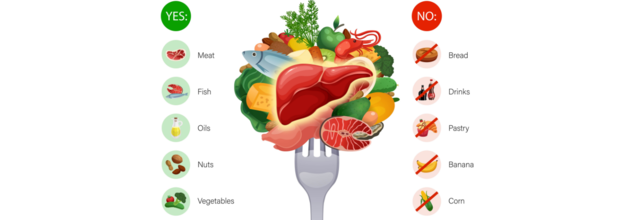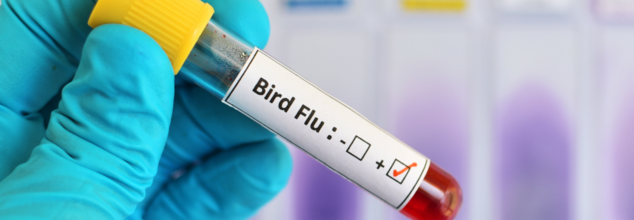
World Liver Day 2025: What Extended Ketosis Really Does To Liver Enzymes And Function
For the millions of people globally, "healthy eating" is a privilege rather than a default choice. From high costs of healthy foods to nutritious food systems that favor profit over health, the obstacles to a liver-supportive diet are real. Among popular diets, the ketogenic diet, or keto, has become extremely popular for its fast weight loss advantages but beneath its high-fat, low-carb framework is a less-discussed issue—how prolonged ketosis can silently burden the liver.
Your liver is your body's control center for detoxification and metabolic regulation. It processes toxins, digests nutrients, produces bile to break down fats, stores energy, and even produces blood-clotting factors.
“While many factors shaping our diet lie outside personal control—like zoning laws, school meal policies, and labeling—what remains in our hands is the knowledge of how our food choices impact our health,” says Nutritionist and Diabetes & Inflammation Specialist, Khushboo Jain Tibrewala.
However, these processes can be easily undone by modern lives—too much booze, sweet diets, lazy lifestyles, and, ironically enough, some hardcore dietary regimes like prolonged keto. The liver's tough, true, but get it working around its metabolic tipping point for sustained periods, and it begins to exhibit symptoms—a lot of which come in the form of abnormal liver enzymes and inflammation.
What Is Ketosis?
Ketosis is a metabolic process by which your body shifts from glucose (carbohydrate) to fat fueling. Carbohydrates in your diet, under normal conditions, get digested into glucose, which gets utilized by the body as fuel. In ketosis, fats are metabolized into ketone bodies—an additional fuel for brain and muscle tissue.
As per Tibrewala, this condition can be triggered by, "A ketogenic diet—intentionally low in carbohydrates and high in fat, or in severe cases of uncontrolled diabetes, where glucose metabolism is disturbed."
Although created initially to control epilepsy, the keto diet is today mainstream. Individuals remain in ketosis for weeks, months, even years. But is such long-term adaptation liver-friendly?
Overburdening the Liver
"The liver is at the center of making ketones," Tibrewala says. "And that process of metabolism is taxing." Sustained levels of ketosis lead to the liver breaking down fats continuously, which in turn increases liver enzymes—namely ALT (alanine aminotransferase) and AST (aspartate aminotransferase).
Clinical research indicates that keto dieters who eat this way in the long term tend to develop signs of hepatic stress even when they do not have fatty liver disease. High enzymes don't necessarily mean instant damage to the liver—but they do signal that the liver is burning out. Left untreated, this can result in inflammation, fibrosis, or even non-alcoholic steatohepatitis (NASH) in vulnerable people.
Low-Carb, Low-Fibre
A significant downfall of ketosis is the drastic reduction of dietary fibre, a substance which is rich in carb-foods such as fruits, whole grains, and legumes. "Fibre is not only for digestion—it's food for your gut microbiome," adds Tibrewala.
A fiber-deficient diet upsets the balance of bacteria in the gut, permitting deleterious strains to dominate. The outcome? Increased permeability of the gut, systemic inflammation, and toxic load—altogether placing further stress on the liver. The organ is thus forced to struggle even harder to detoxify these toxins, added to its already high workload under ketosis.
Hidden Harm of Processed Keto Products
Ironically, most keto believers resort to processed foods to fulfill their macronutrient needs. From protein powders and MCT oils, snack bars, to exogenous ketone supplements, they are filled with preservatives, additives, and in some, heavy metals.
"These artificial substances are processed through the liver, which is yet another source of stress," Tibrewala observes. Gradually, this higher toxic load—combined with compromised gut integrity—can drive the liver toward pathology, even if there are no obvious symptoms.
Therapeutic vs. Trendy: When Does Ketosis Make Sense?
It’s important to acknowledge that ketosis, in short, supervised intervals, may have therapeutic potential—particularly for managing epilepsy, obesity, or insulin resistance. But long-term, unsupervised ketosis can be a slippery slope.
A liver in constant ketone-production mode is analogous to a machine running non-stop—it wears out faster. “Our liver thrives on balance, moderation, and nourishment—not on extremes,” emphasizes Tibrewala.
What Can You Do for Your Liver?
Select balanced nutrition: Eat whole grains, plant protein, and high fibre foods.
Steer clear of ultra-processed keto treats and go for whole-food fats such as avocado, nuts, and seeds.
Restrict ketosis to short cycles, if at all, and always after consulting a health professional.
Emphasize gut health with probiotics, prebiotics, and fermented foods. A healthy gut lightens the burden on your liver.
Drink water and move around—two simple but potent aids to liver detox and metabolic equilibrium.
In the quest for weight reduction or "biohacking," extended ketosis has been hailed as revolutionary but your liver- the powerhouse of your metabolism tends to take the hit.
Khushboo Jain Tibrewala is a Nutritionist and Diabetes & Inflammation specialist at The Health Pantry in India

Credit: Canva
Eating Bell Peppers Can Make You Look Younger! Here Are Foods That Boost Collagen Production
Collagen is the hottest skincare trend. Both social media and retail markets are filled with collagen supplements and collagen boosting products. While there is little scientific evidence proving their sanctity, there is a range of food items that boost your collagen naturally. Before we read about them, one by one, let's first understand what is collagen and why we need it.
Explained in simple terms, collagen is a protein that provides structure, support and strength to skin, muscles, bones as well as connective tissues of the body. As we age, we produce less collagen in our skin every year. Therefore, there is a tendency toward wrinkles and thinning skin as we get older.
Here Are Foods That Boost Collagen Production
Bone Broth: While it is often considered a rich source of collagen, research suggests otherwise. A 2019 study found that bone broth typically doesn’t contain enough collagen to make a significant impact. It’s made by simmering animal bones in water to extract nutrients, including collagen.
Chicken: Collagen supplements are often made from chicken—and for good reason. Poultry is relatively high in this protein, especially in its connective tissues. If you've ever prepared a whole chicken, you've likely noticed the visible connective tissues, which make it a good source of dietary collagen. A 2022 mouse study used collagen derived from chicken bone and cartilage to relieve arthritis and inflammation. However, the collagen content can vary between parts of the bird, with thigh meat generally offering more than the breast.
Fish: Fish, like other animals, have collagen-rich bones and ligaments. Some studies suggest that marine collagen may be more easily absorbed by the body and is particularly beneficial for skin health. But while fish like tuna or salmon contribute to collagen intake, the flesh contains less collagen compared to other parts, such as the head, scales, or eyes—parts not commonly consumed.
Egg Whites: Although eggs lack connective tissue, egg whites are a good source of proline, an amino acid that plays a key role in collagen production.
Citrus Fruits: Vitamin C is crucial for collagen synthesis as it aids in the production of pro-collagen, the body’s collagen precursor. Citrus fruits such as oranges, grapefruit, lemons, and limes are excellent sources. Try incorporating them through broiled grapefruit at breakfast, orange segments in a salad, or yellow peppers in a stir-fry.
Berries: Berries like strawberries, raspberries, blueberries, and blackberries are also high in vitamin C and antioxidants, which can protect skin from damage. “Berries are also high in antioxidants, which protect the skin from damage,” Davidson added.
Tropical Fruits: Fruits such as mango, kiwi, pineapple, and guava also deliver vitamin C. Guava even provides a small amount of zinc, another nutrient essential for collagen formation.
Garlic: More than just a flavorful addition to meals, garlic may support collagen production. Garlic is high in sulfur, which is a trace mineral that helps synthesize and prevent the breakdown of collagen. However, quantity matters—substantial intake may be required to see a benefit.
Leafy Greens: Vegetables such as spinach, kale, and Swiss chard are not only nutritious but may also benefit the skin. Their green color comes from chlorophyll, known for its antioxidant properties. Some studies have shown that consuming chlorophyll increases the precursor to collagen in the skin.
Beans: Rich in protein, many beans also contain lysine—an amino acid necessary for collagen production—as well as copper, another collagen-supporting nutrient.
Cashews: They are a great snack for collagen support as they contain zinc and copper, both of which help the body produce collagen.
Tomatoes: Often overlooked, tomatoes are a good source of vitamin C and contain lycopene, an antioxidant that supports skin health.
Bell Peppers: Also rich in vitamin C, bell peppers can be a colourful and nutritious addition to salads and stir-fries, contributing to collagen synthesis.

(Credit-Canva)
Amid Conflicting Bird Flu Reports, Parents Are Struggling To Find Reliable Information For Kids Safety
As bird flu progresses in US, parents along with other concerned citizens of the country are scrambling to get information about it. Centers of Disease Control and Prevention (CDC) explains that while the current risk is low, they are working towards bettering the situation with the help of state and monitoring people with animal exposure.
It's hard for parents to know what's really going on with bird flu. A recent survey done by University of Michigan Health C.S. Mott Children's Hospital National Poll on Children's Health showed that many parents just can't find good, trustworthy information. Parents don't know who to believe or where to look which makes them feel worried and unsure about how to keep their families safe. It is important to know the real facts, but it's tough when they find varied reports everywhere. Some parents think the news is making it sound worse than it is, while others are concerned that not enough is being done.
What Are Parents Concerned About?
Many parents are feeling lost when trying to find information about bird flu. They see different stories online and on TV, and they don't know what's true. This makes them worry because they want to protect their kids. Parents mostly rely on news reports (78%) for information, while others use social media is also a common source (31%). The rest turn to the internet (19%), family and friends (15%), government agencies (11%) and health care providers (11%) .
Parents are worried about bird flu spreading to people. They're scared that animals could give it to humans, or that people could give it to each other. They're also not sure if the government can handle a big outbreak. They don't have much confidence that the government can get rid of infected animals or food. They're also worried that they won't get clear information about recalls or how to get rid of dangerous products. They just want to feel like someone is in control.
The survey also revealed that one-third of the parents took action to protect their family against the bird flu, while 22% were being more careful about the hygiene. Of them, 13% were cautious handling eggs, chicken and other meat products, 12% avoid contact with birds, and 10% avoided raw milk.
Flu viruses can infect chicken eggs by entering through the eggshell. The eggshells are smaller than the pores of eggshells, which means viruses can enter the eggs and the egg's surface will still be protected. However, it is still important to handle it safely.
As per the US Food and Drug Administration, cooking poultry, eggs and other animal products to the proper temperature and preventing cross-contamination between raw and cooked food.
Symptoms of Bird Flu to Watch for
- Pink eye
- fever
- fatigue
- cough
- muscle aches
- sore throat
- nausea
- vomiting
- diarrhea
- study or runny nose
- shortness of breath
What Can Parents Do?
To feel safer, some parents are changing their habits. They're being extra careful about washing their hands and keeping things clean. Some are also being more careful when handling chicken and eggs, making sure they're cooked properly. Some parents are even avoiding contact with birds and wild animals, just to be safe. They're also being cautious about drinking raw milk and are eating less chicken and eggs. They are trying to be proactive.
The survey revealed that parents don't feel like they can trust the government's response to bird flu. This lack of trust makes them even more worried. When people don't know what's happening, they get scared. It's important for health officials to be open and honest about what they're doing to stop the spread of the virus. They need to give clear information about how to stay safe with food. This will help parents feel more calm and confident.

Credit: Canva
Chinese Shop Offers 'Placenta Processing', Sells Capsules Made After Birth
A snack shop in southeastern China has come under fire after allegedly advertising "placenta processing" services and selling capsules made from afterbirth. The incident, which surfaced on April 6, has triggered widespread criticism and prompted an official investigation.
The controversy began when a netizen posted online about Auntie Congee’s Snack Shop, located near the Changzhou Hospital of Traditional Chinese Medicine in Jiangsu province. According to the post, the shop was involved in the processing of human placentas and selling them in capsule form, claiming health-boosting properties.
Images shared on social media revealed a signboard outside the store clearly stating “placenta processing.” The shop reportedly charged 800 yuan (US$110) if the customer did not provide their own placenta, and 300 yuan if they did. The business claimed that all placentas used were obtained from new mothers in hospitals.
The owner, who previously worked in post-partum recovery, told local media that she could also connect customers with maternity matrons. Alongside the physical snack shop, she also operated an online store named Zixuan Maternity Matron Centre.
The online platform offered various post-partum services, including maternity care, childcare, meal preparation for new mothers, placenta processing, and recovery services. Promotional materials showed the process of grinding placentas with ingredients such as ginseng powder and turning the mixture into capsules, which were labelled *ziheche*, the term used in traditional Chinese medicine for placenta.
A poster advertising the shop highlighted the supposed benefits of consuming placenta, noting it is rich in protein and nutrients. It also mentioned two processing techniques—patented freezing and traditional methods—offering customers the option to observe the process in person.
The Shop Has Been Shut Down For Rectification
On April 8, the Changzhou Municipal Health Commission informed Jimu News that the shop had been shut down for rectification. A commission staff member stated, “We are currently investigating the source of the placentas. Preliminary findings indicate that they did not come from any hospital.”
In traditional Chinese medicine (TCM), the use of placenta has long been believed to help replenish energy and nourish the blood. It is sometimes recommended for individuals experiencing fatigue, chronic coughing, or infertility. However, citing ethical and safety concerns, the Chinese Pharmacopoeia delisted placenta as an approved medicinal ingredient in 2015.
Under Chinese law, placentas are considered the personal property of the post-partum mother, who alone can decide how they are disposed of. The sale of placentas by individuals or organisations remains illegal.
The case, initially reported by the Yangtze Evening News, has sparked outrage online. One user remarked, “I really cannot believe there are people who eat placenta as food. It is so disgusting.” Another added, “It is already the year 2025! Who even believes in such nonsense? And treating women as some kind of ‘superfood’—is that not objectifying women?” A third person said, “This is not surprising at all. In the past, hospitals would ask mothers whether they wanted to keep their placentas. If they did, it was usually consumed as food.”
© 2024 Bennett, Coleman & Company Limited

